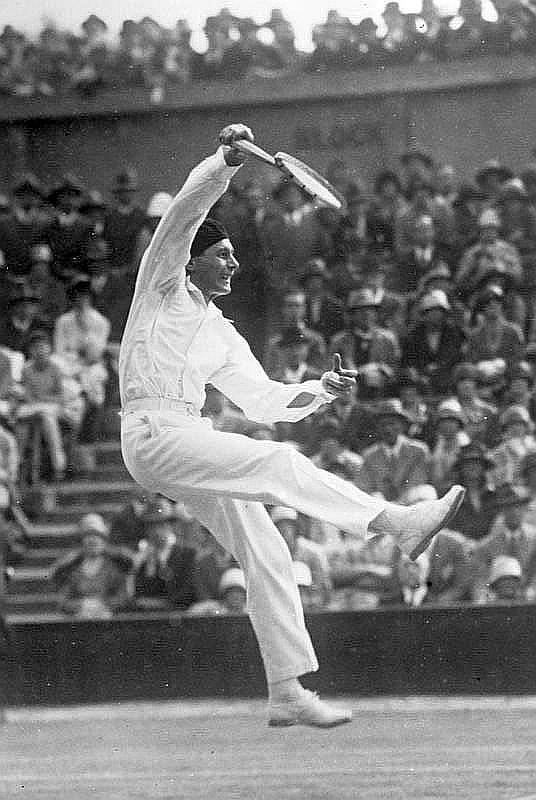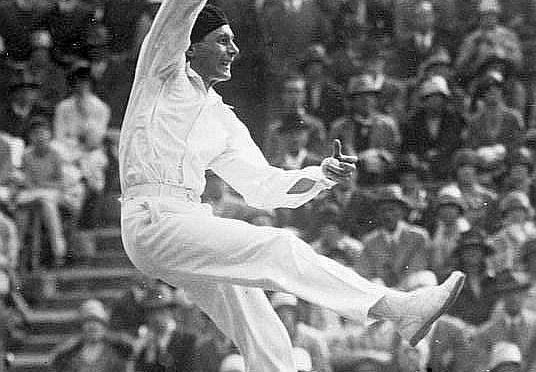Jean Borotra was a man of contrasts. One of the best tennis players in the world, he played with Kings and won a total of 19 Grand Slam titles. He fought in both World War I and II against the Germans, but was also a commissioner in the Nazi-collaborating Vichy government in France. He made a daring escape from a German prison to help liberate his fellow prisoners. And, he was an international spokesman for fair play in sports.

- Jean Laurent Robert Borotra was born in Arbonne, just outside of Biarritz, on August 13, 1898. As a child, he played soccer, rugby and pelota. It wasn’t until after World War I, when he was 20 years old, that he started playing tennis seriously. He received an engineering degree from L’Ecole Polytechnique in 1922 and was constantly juggling his engineering and tennis careers.
- He was one of the “Four Musketeers,” four Frenchmen who came to dominate tennis in the 1920s and 1930s. Borotra himself won four Grand Slam singles titles in France, England, and Australia. He barely missed out on a career Grand Slam, losing in the finals of the US Championship to fellow Four-Musketeer René Lacoste, who later developed the Lacoste clothing line, famous for the green crocodile that came from his nickname. Borotra reached as high as number 2 in the world rankings. He was also the first person from a non-English speaking country to win at Wimbledon, in 1924. He was still playing doubles matches in his 60s.
- Borotra’s nickname, the Bounding Basque, came from his energetic play, particularly his attacks on the net. He had an improvising style, was known as a great volleyer, and kept up a pace that wore his opponents out. He wore a blue beret – a txapela – while playing and had a presence that captivated audiences. He was famous for conceding disputed points to his opponents. When his play took him into the stands, he would kiss the hands of the women he found. His valet would give flowers to the women who asked for his autograph.
- During World War II, he served as a captain in the French Army and later as General Commissioner for Education and Sports in the Vichy government. In 1942, while trying to escape to North Africa to join Allied forces, he was arrested by the Gestapo. He was pumped full of “truth serum” and then taken to a concentration camp where he was put in solitary confinement for six months. He stayed there until the King of Sweden Gustaf V, a tennis fan and an acquaintance, at the behest of Lacoste, intervened. Borotra was eventually taken to the prisoner of war camp at Itter Castle.
- He was a key figure in the Battle of Castle Itter, the only known battle in World War II in which American and German troops fought together. Borotra leaped the castle walls and ran through a gauntlet of SS checkpoints to deliver a message containing details of the enemy’s positions to a relief force. He then asked for an American uniform and joined the force to free the prison.
- Later in life, Borotra founded the International Fair Play Committee, dedicated to promoting sportsmanship internationally. The Jean Borotra World Fair Play Trophy is given to athletes who have sustained a career of fair play.
Primary sources: Jean Borotra Is Dead at 95; One of Tennis’s ‘4 Musketeers’, Christopher Clarey, New York Times 1994; Wikipedia; Encyclopédie Larousse; Arozamena Ayala, Ainhoa. BOROTRA, Jean. Enciclopedia Auñamendi, 2020. Available at: http://aunamendi.eusko-ikaskuntza.eus/es/borotra-jean/ar-33385/; Jean Borotra, The Most Interesting Man In Tennis, Won 19 Grand Slams And Escaped A Nazi Prison, Adam Doster, Deadspin.com


